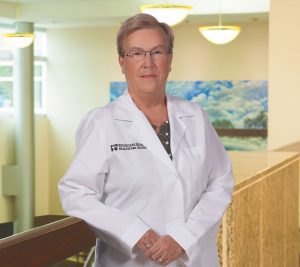 According to the American Cancer Society, colorectal cancer is the third-leading cause of cancer-related deaths in the United States.
According to the American Cancer Society, colorectal cancer is the third-leading cause of cancer-related deaths in the United States.
Despite being preventable and treatable, many individuals still die from this disease due to a lack of awareness about preventive care.
Physicians Regional is committed to promoting early detection and prevention of colon cancer through regular colonoscopy screenings because, when detected early, the survival rate for colon cancer is approximately 90%.
Screenings involve doctors examining the colon and rectum for pre-cancerous polyps, which are removed, reducing the risk of developing colon cancer in the future.
Many people fear that there might be discomfort and pain associated with a colonoscopy. However, it’s important to know that you will be in a “twilight sleep.” Unlike general anesthesia, which puts patients to sleep completely, conscious sedation keeps patients drowsy and comfortable, yet awake enough to respond to questions and follow instructions.
“Colonoscopies may not be the most enjoyable procedure, but they are essential for early detection and prevention of colon cancer,” said Margaret Avery, a family nurse practitioner with Physicians Regional Medical Group.. “Don’t delay getting what could be a life-saving procedure.”
Colonoscopy screening should start at age 45 for those at average risk, with regular screenings continuing every 10 years. However, the screening frequency and start date may differ for individuals at higher risk of developing the disease, as colorectal cancer incidence is higher in certain populations, including Black and Indigenous adults, people with a family history of colorectal cancer, and men.
Age also plays a big factor when it comes to risk. On average, those 50 and older are the most likely to suffer from colorectal cancer. While age and family history cannot be changed, there are several lifestyle factors that you can modify to lower your risk, including losing weight, maintaining a healthy diet, limiting alcohol, quitting smoking and regular exercise.
“Colonoscopies have revolutionized how we detect and prevent colon cancer. With advancements in technology and improved patient comfort, there’s never been a better time to prioritize your colon health,” Avery said.
Avery Provides primary care with an in-depth knowledge of emergency and critical care, pre and post-operative care, colorectal surgery, cancer screenings, early cancer detection and colon health.
Margaret also has a special interest in patient education which includes preventive medicine, lifestyle changes, proper diet and surgical complication prevention.
Talk to your healthcare provider about your risk level and the appropriate timing and frequency for screenings. Remember, you’re never too young to take charge of your health.
Physicians Regional Medical Group
To make an appointment, please call 239-348-4128 or visit https://www.physiciansregionalmedicalgroup.com/doctors-providers









